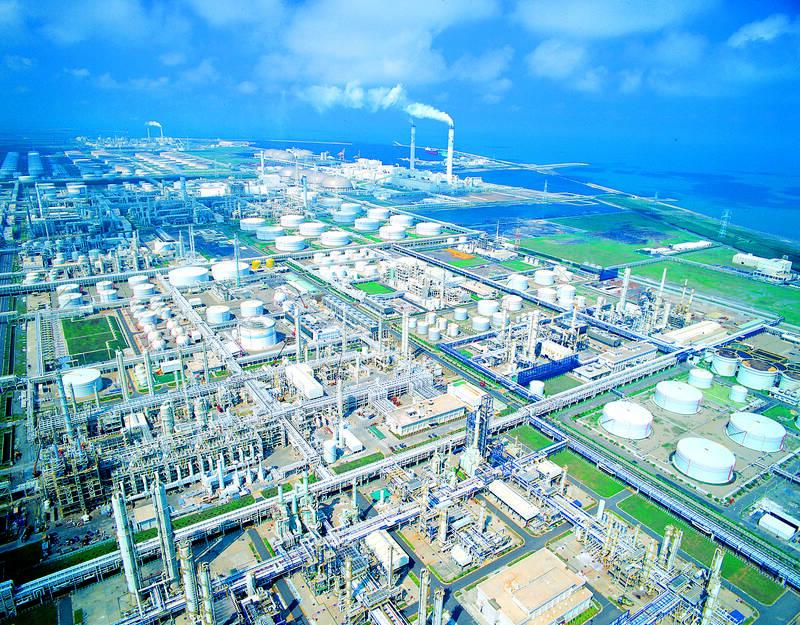The four major units of Formosa Plastics Group (FPG, 台塑集團), the nation’s largest industrial conglomerate, on Wednesday reported their net profits last quarter all fell from the previous quarter due to a decrease in non-operating income and the impact of foreign exchange losses.
This quarter, the four units — Formosa Plastics Corp (台灣塑膠), Nan Ya Plastics Corp (南亞塑膠), Formosa Chemicals and Fibre Corp (台灣化學纖維) and Formosa Petrochemical Corp (台塑石化) — are expected to see their operations affected by low oil prices and weak seasonal demand for oil products, analysts said.
Factors such as soft petrochemical demand amid a slow China recovery, disruption during the Lunar New Year holiday and fierce market competition amid new capacity ramp-up in foreign markets would also weigh on the units’ business performance, they added.

Photo: Taipei Times File Photo
“In the mid-to-long term, we anticipate a weak demand recovery overall, given persistent sector oversupply as China and the US continue to ramp up new capacity,” Yuanta Securities Investment Consulting Co (元大投顧) analysts said in a research note on Thursday. “For this year, with demand to recover as inventory adjustment ends, we expect Formosa Plastics, Nan Ya Plastics and Formosa Chemicals to see sales and earnings improve. However, carbon fee levies from this year will negatively impact earnings.”
During the October-to-December quarter, Formosa Plastics swung into a net loss of NT$2.88 billion (US$92.52 million) due to annual maintenance and demand weakness, as well as narrower investment gains, while Nan Ya Plastics saw its net profit contract 96.8 percent sequentially to NT$140 million on fewer investment gains and higher foreign exchange losses, the companies said in separate regulatory filings.
Formosa Chemicals’ net profit plunged 99.2 percent quarter-on-quarter to NT$574 million, hit by weakened demand and oversupply in China, coupled with narrower investment gains. Formosa Petrochemical’s net profit also fell 91.7 percent to NT$1.43 billion in the past quarter, given a slump in oil prices, narrower refinery and olefin product spreads, and inventory impairment and foreign exchange losses, their filings showed.
The FPG units posted a combined net profit of NT$44.01 billion last year, down 51.2 percent from a year earlier, as their operating income turned from profit to loss amid a negative macroeconomic environment that led to lower product prices and smaller sales volumes.
The four units' combined operating profit plunged 82.7 percent year-on-year to NT$58.96 billion, while revenue fell nearly 18 percent to NT$1.83 trillion compared with a year earlier.
Formosa Plastics, the group’s flagship company, reported its net profit last year fell 79.7 percent from the previous year to NT$7.35 billion, or earnings per share (EPS) of NT$1.15, and Nan Ya Plastics, the nation’s largest plastics maker, saw its net profit drop 80.4 percent to NT$6.31 billion, or EPS of NT$0.8.
Formosa Chemicals, which manufactures aromatics and styrenics, said its net profit grew 15.3 percent to NT$8.49 billion, or EPS of NT$1.45.
Formosa Petrochemical, the nation’s only listed oil refiner, reported its net profit rose 51.6 percent to NT$21.86 billion, or EPS of NT$2.3.

South Korea’s equity benchmark yesterday crossed a new milestone just a month after surpassing the once-unthinkable 5,000 mark as surging global memory demand powers the country’s biggest chipmakers. The KOSPI advanced as much as 2.6 percent to a record 6,123, with Samsung Electronics Co and SK Hynix Inc each gaining more than 2 percent. With the benchmark now up 45 percent this year, South Korea’s stock market capitalization has also moved past France’s, following last month’s overtaking of Germany’s. Long overlooked by foreign funds, despite being undervalued, South Korean stocks have now emerged as clear winners in the global market. The so-called “artificial intelligence

NEW IDENTITY: Known for its software, India has expanded into hardware, with its semiconductor industry growing from US$38bn in 2023 to US$45bn to US$50bn India on Saturday inaugurated its first semiconductor assembly and test facility, a milestone in the government’s push to reduce dependence on foreign chipmakers and stake a claim in a sector dominated by China. Indian Prime Minister Narendra Modi opened US firm Micron Technology Inc’s semiconductor assembly, test and packaging unit in his home state of Gujarat, hailing the “dawn of a new era” for India’s technology ambitions. “When young Indians look back in the future, they will see this decade as the turning point in our tech future,” Modi told the event, which was broadcast on his YouTube channel. The plant would convert

‘SEISMIC SHIFT’: The researcher forecast there would be about 1.1 billion mobile shipments this year, down from 1.26 billion the prior year and erasing years of gains The global smartphone market is expected to contract 12.9 percent this year due to the unprecedented memorychip shortage, marking “a crisis like no other,” researcher International Data Corp (IDC) said. The new forecast, a dramatic revision down from earlier estimates, gives the latest accounting of the ongoing memory crunch that is affecting every corner of the electronics industry. The demand for advanced memory to power artificial intelligence (AI) tasks has drained global supply until well into next year and jeopardizes the business model of many smartphone makers. IDC forecast about 1.1 billion mobile shipments this year, down from 1.26 billion the prior

People stand in a Pokemon store in Tokyo on Thursday. One of the world highest-grossing franchises is celebrated its 30th anniversary yesterday.